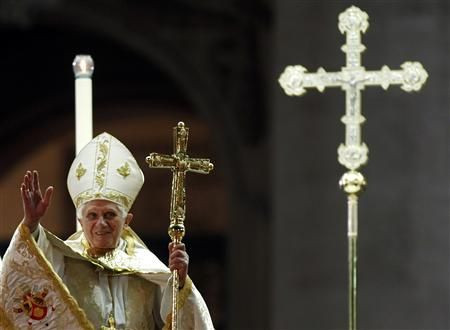Vatican Calls for Economic Equality, Urges Wall Street to Examine Impact on Humanity

The Vatican called for far-reaching reforms of the global economy on Monday, advocating the creation of an ethical, global authority to regulate the financial markets as mass protests against corporate greed and income inequality continue to spread across the world.
An 18-page document from the Vatican's Justice and Peace department proposes creating a new economic world order based on ethics and the achievement of a universal common good. The current economic crisis, according to the Vatican, has revealed behaviors such as selfishness, collective greed and the hoarding of goods on a great scale, among the elite, adding that global economics requires an ethic of solidarity among the rich and poor countries.
Vatican pronouncements on the economy are meant to be a resource for world leaders as well as the global church, The Associated Press reports. The proposal calls for the establishment of a supranational authority that has universal jurisdiction to guide economic policies and decisions, which the letter suggested should begin with the United Nations as a reference point.
Vatican: Economic Goals Must Include the Common Good
The fruit of such reforms ought to be a greater ability to adopt policies and choices that are binding because they are aimed at achieving the common good on the local, regional and world levels. Among the policies, those regarding global social justice seem most urgent: financial and monetary policies that will not damage the weakest countries; and policies aimed at achieving free and stable markets and a fair distribution of world wealth, the letter states.
The Vatican document was released as the Occupy Wall Street protests that began last month gain international prominence, sparking similar movements across Europe, China and Australia. The letter condemns the idolatry of the market, as well as utilitarian thinking that emphasizes what it useful for the individual rather than the common good.
Critiques Conservatives' Unregulated Capitalism
Vincent J. Miller, the Gudorf Chair in Catholic Theology and Culture at the University of Dayton, said in a statement the message from the Vatican is a stark contrast from conservative efforts that tout unregulated capitalism and deride Wall Street reform.
While conservative leaders and several presidential candidates want to eviscerate financial reform, the Vatican has sent a powerful message that prudent regulation of our financial system is a moral priority, Miller said. I expect Catholic neo-cons who usually present themselves as the defenders of orthodoxy will ignore or scramble to defuse this timely teaching. It's clear the Vatican stands with the Occupy Wall Street protesters and others struggling to return ethics and good governance to a financial sector grown out of control after 30 years of deregulation.
Where Do 2012 GOP Presidential Candidates Stand?
Several candidates running for the 2012 Republican nomination who advertise their Christian faith have spoken out against reforms in the financial industry. Rep. Michele Bachmann, a well-known Evangelical Christian who has made her faith a central part of her platform, as well as fellow Evangelical Gov. Rick Perry and former Sen. Rick Santorum -- a devout Catholic -- have all called for the repeal of the Dodd-Frank Wall Street Reform and Consumer Protection Act, a reform law aimed at preventing an economic crisis similar to that of 2008 which has been called the greatest change to the U.S. financial regulation system since the Great Depression.
Former Gov. Mitt Romney, a Mormon, as well as Herman Cain -- also an Evangelical Christian -- and Rep. Ron Paul, who professes to be a devout Christian, have all said they would repeal the Dodd-Frank reform. Almost all of the Republican candidates have derided the Occupy Wall Street movement since it began, with Cain notoriously saying the protesters were anti-American and had only themselves to blame if they were not rich or if they were unemployed.
Meanwhile, many conservatives in the U.S. have continuously attacked government programs that assist the nation's poor, including Medicare, Medicaid and Social Security.
Holy See Has Differed With Conservative Christians Before
This is not the first time that religious leaders have spoken out against the interests of self-professed religious conservatives. During the debt ceiling debate earlier this year, a faculty member from The Catholic University of America delivered a letter to House Speaker John Boehner, who is a practicing Catholic, signed by more than 70 Catholic scholars, clergy and leaders that challenged his willingness to gut social programs that serve the poor while protecting tax cuts for corporations and the wealthy.
Your record in support of legislation to address the desperate needs of the poor is among the worst in Congress. This fundamental concern should have great urgency for Catholic policy makers. Yet, even now, you work in opposition to it, they wrote.
More recently, on Oct. 21 Father Thomas Reese, a senior fellow at the Woodstock Theological Center at Georgetown University, wrote a column in the Holy Post that said the Vatican's position on economic equality is to the left of almost every politician in the U.S., writing that Pope Benedict XVI unflinchingly supports the 'redistribution of wealth' when he talks about the role of government.
© Copyright IBTimes 2024. All rights reserved.





















